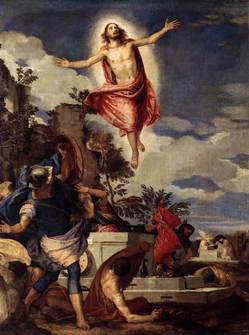 If [God] had no need of the flesh, why did He heal it? And what is most forcible of all, He raised the dead. Why? Was it not to show what the resurrection should be? How then did He raise the dead? Their souls or their bodies? Manifestly both. If the resurrection were only spiritual, it was requisite that He, in raising the dead, should show the body lying apart by itself, and the soul living apart by itself. But now He did not do so, but raised the body, confirming in it the promise of life. Why did He rise in the flesh in which He suffered, unless to show the resurrection of the flesh? And wishing to confirm this, when His disciples did not know whether to believe He had truly risen in the body, and were looking upon Him and doubting, He said to them, "Ye have not yet faith, see that it is I"; and He let them handle Him, and showed them the prints of the nails in His hands. And when they were by every kind of proof persuaded that it was Himself, and in the body, they asked Him to eat with them, that they might thus still more accurately ascertain that He had in verity risen bodily; and He did eat honey-comb and fish. And when He had thus shown them that there is truly a resurrection of the flesh, wishing to show them this also, that it is not impossible for flesh to ascend into heaven (as He had said that our dwelling-place is in heaven), "He was taken up into heaven while they beheld," as He was in the flesh. If, therefore, after all that has been said, any one demand demonstration of the resurrection, he is in no respect different from the Sadducees, since the resurrection of the flesh is the power of God, and, being above all reasoning, is established by faith, and seen in works.
If [God] had no need of the flesh, why did He heal it? And what is most forcible of all, He raised the dead. Why? Was it not to show what the resurrection should be? How then did He raise the dead? Their souls or their bodies? Manifestly both. If the resurrection were only spiritual, it was requisite that He, in raising the dead, should show the body lying apart by itself, and the soul living apart by itself. But now He did not do so, but raised the body, confirming in it the promise of life. Why did He rise in the flesh in which He suffered, unless to show the resurrection of the flesh? And wishing to confirm this, when His disciples did not know whether to believe He had truly risen in the body, and were looking upon Him and doubting, He said to them, "Ye have not yet faith, see that it is I"; and He let them handle Him, and showed them the prints of the nails in His hands. And when they were by every kind of proof persuaded that it was Himself, and in the body, they asked Him to eat with them, that they might thus still more accurately ascertain that He had in verity risen bodily; and He did eat honey-comb and fish. And when He had thus shown them that there is truly a resurrection of the flesh, wishing to show them this also, that it is not impossible for flesh to ascend into heaven (as He had said that our dwelling-place is in heaven), "He was taken up into heaven while they beheld," as He was in the flesh. If, therefore, after all that has been said, any one demand demonstration of the resurrection, he is in no respect different from the Sadducees, since the resurrection of the flesh is the power of God, and, being above all reasoning, is established by faith, and seen in works.
Saint Justin Martyr, before A.D. 165, from some lost fragments on the Ressurection

